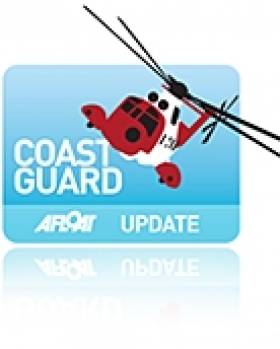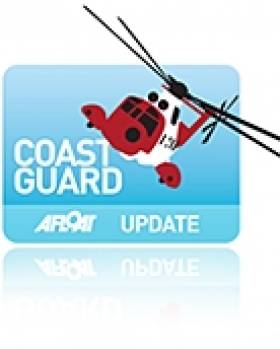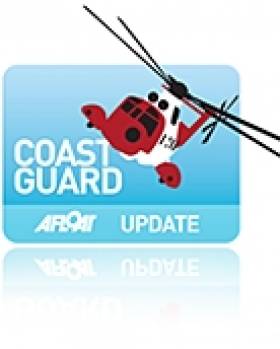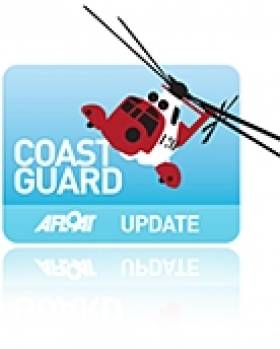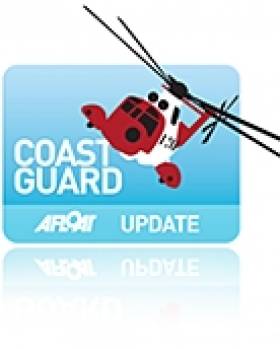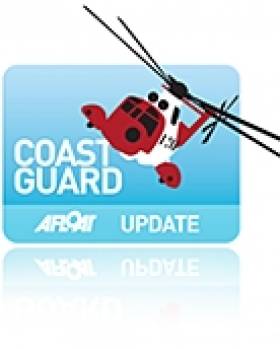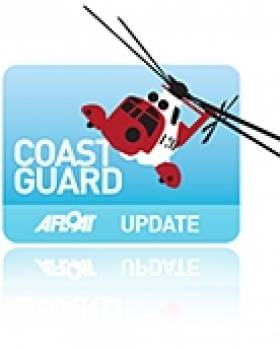Displaying items by tag: Irish Coast Guard
Coast Guard Hits Out Over Search & Rescue Deal Reports
The Irish Coast Guard (IRCG) has lashed out over newspaper articles on the recent €500m deal with CHC Ireland to provide search and rescue services.
The it was recently reported in an Irish newspaper that Fine Gael TD Fergus O'Dowd called for an investigation into the deal. This followed a previous article in the same publication which claimed proposals by the Air Corps to provide the same service at a lower rate were rejected on the grounds that its main helicopter did not have a "good reputation".
But IRCG director Chris Reynolds has hit out at the newspaper for ignoring its clarifications over the CHC Ireland contract.
In correspondence seen by Afloat.ie, Reynolds answered questions from the paper regarding the nature of the deal.
Among them he explained that the invitation to tender was publicly advertised and open, but that the then Minister of Defence had made a policy decision in 2004 to remove the Air Corps from search and rescue services due to "operational difficulties" and precluded them as an option.
Reynolds emphasised that it was a Department of Defence directive that the deal be "100% civilian".
He also disputed any link between the CHC Ireland deal and one made by its parent company in the UK, which has been called into question over perceived irregularities.
Meanwhile, Afloat.ie has seen correspondence from CHC Ireland to former Minister for Transport Pat Carey assuring that the cancelling of the UK deal has no bearing on the provision of its services to the Irish Coast Guard.
Coastguard Assists Mourne Rescue Team
Belfast coastguard responded to two requests assisting the Mourne Mountain Rescue Team on Saturday, BYM Marine & Maritime News reports.
The first followed reports of an injured walker in the Glen River Valley around 2pm. Helicopter assistance was stood down due to adverse weather conditions and the walker was stretchered off the mountain.
The second request came after 4pm, after a woman had fallen in a gully at the top of Slieve Begg. Irish Coast Guard rescue helicopter R116 was dispatched along with the South Down Coastguard Rescue team to locate the woman, who suffererd lower leg injuries and was airlifted to hospital in Newry.
Alan Pritchard, watch manager at the NI coastguard control centre at Bangor, urged the public to take care when out on coastal, river or mountain walks.
He also reminded people to dress sensibly for the weather and the terrain, and let others know of their whereabouts in case of distress.
Search and Rescue Deal Under Question
The Irish Coast Guard's recent €500m deal with CHC Ireland to provide search and rescue services should be investigated, a Fine Gael TD has urged.
According to the Irish Independent, Fergus O'Dowd is questioning the deal after receiving documents under the Freedom of Information act in which the head of the Irish Coast Guard said the Air Corps were uneqipped for the role and no cost saving would be made if they took on the service.
As previously reported on Afloat.ie, the Air Corps' helicopter supplier AgustaWestland strongly disputed allegations that its helicopters did not have a "good reputation".
The contract will see CHC Ireland provide four helicopters (plus one backup) across the country on a 10-year lease. It is understood that this will include one new Sikorsky S-92 helicopters and four second-hand machines from the UK.
Meanwhile, controversy has arisen regarding a similar deal in the UK with a consortium that includes CHC Ireland's parent firm.
The British government has abandoned the procurement process over claims of irregularities in the bidding process of the deal which went to Soteria, a consortium including CHC, Sikorsky and French defence group Thales.
The Irish Independent has more on the story HERE.
Coast Guard Gets Air Ambulance Status
Helicopter crews with the Irish Coast Guard have been awarded full air ambulance status more than a year ahead of schedule, The Irish Times reports.
Under the upgrade, there will be at least one trained paramedic on board any search and rescue flight whether inland or at sea. Previously they operated at 'emergency medical technician' level.
Paramedic status allows trained crews to give injections and administer advanced techniques to clear airways or treat cardiac arrest.
Transport Minister Pat Carey, who comfirmed the move, said: "“The introduction of new technology and the improved paramedic level of care will see quite a significant improvement in capabilities.”
Portaferry RNLI Rescues Four from Fishing Vessel
The Portaferry RNLI lifeboat was involved in the rescue of four men from a fishing boat that ran aground off the coast last Monday evening, the Belfast Telegraph reports.
The lifeboat along with the Portaferry and Newcastle Coastguard and and Irish Coast Guard helicopter from Dublin responded to a distress call from a 60ft trawler that ran into difficulties close to Ardglass harbour.
All four men on board were rescued and treated by paramedics on scene, and the vessel was later refloated.
Related Safety posts
RNLI Lifeboats in Ireland
Safety News
Rescue News from RNLI Lifeboats in Ireland
Coast Guard News from Ireland
Water Safety News from Ireland
Marine Casualty Investigation Board News
Marine Warnings
Coast Guard Rescues Woman in Clontarf
A Coast Guard helicopter was dispatched to rescue a woman from the water close to Bull Bridge in Clontarf on Sunday night, The Irish Times reports.
Four Coast Guard search teams were deployed to the area after a passer-by notified gardaí of a woman walking in shallow water near the seafront wall around 6pm.
A member of one of the search teams spotted the woman in waist-deep water between the Clontarf seafront and Dublin Port. Coast Guard rescue helicopter 116 then moved in to lift her from the water.
The woman, who was reportedly disoriented and in a confused state, was transferred to ambulance and taken to hospital for treatment.
Budget 2011: Fisheries Spending Maintained, Cuts to Irish Sports Council
Expenditure on fisheries will be maintained at 2010 levels under the Budget for 2011 announced today.
Minister for Agriculture, Fisheries and Food, Brendan Smith TD, welcomed the protection of expenditure in forestry/bioenergy and fisheries, saying it “reflects the important economic and social contributions that both sectors make to rural and coastal communities throughout the country and the potential that they have to play in the wider economy.”
Elsewhere in the Budget, the rise in the cost of fuel - which will hurt motorists and many boat-owners alike - is accompanied by cuts across Government departments which could affect maritime activities from sport to coastal policing.
Cuts to the Tourism, Culture & Sport will mean reduced finding for the already cash-strapped Irish Sports Council and other sporting bodies, hitting hard on Ireland’s developing sporting talent - particularly in niche maritime and water sports.
No specific cuts to naval spending were outlined, but the Defence budget will be reduced by €28 million in the coming year, which will also see a halt on the acquisition of replacement equipment and maintenance projects.
However this does not apply to the producement of two new naval vessels which “will continue within the reduced allocation for Defence spending”, according to Minister for Defence Tony Killeen TD.
No details were given for any proposed cuts to the Irish Coast Guard and Maritime Safety Directorate, although the Department of Transport which overseas both arms of the Maritime Safety Services will face cuts of €32 million in 2011.
Coast Guard Winchman Retires after 30 Years' Service
Noel Donnelly (55), who is retiring after more than 30 years' service, worked as winchman and paramedic. He completed his last shift at the Sligo Coast Guard search and rescue base last week and retires officially this month.
Originally from Tyrone, Mr Donnelly began his career with the Air Corps, flying in Alouette and Puma helicopters. He left in 1984 to take a job as a diver with a civil engineering firm in Aberdeen, Scotland, and subsequently worked as an ambulance driver in Co Kildare. For more about this article please click here
Dempsey Applauds Irish Coast Guard as new TV Series Showcases Vital Rescue Service
Minister for Transport Noel Dempsey TD today applauded the Irish Coast Guard service as a new TV series on Ireland's national search and rescue service begins on RTE 1 this evening.
Speaking today, Minister Dempsey said: "This exciting new series will be the first time that the Irish public will get an exclusive insight into the day-to-day life saving work of the Irish Coast Guard. I hope that viewers will appreciate the superb service that the Irish Coast Guard provides, frequently in very extreme conditions and often involving very real life and death situations."
Director of the Irish Coast Guard, Mr. Chris Reynolds said, "The main role of the Irish Coast Guard is to provide Ireland with 24/7/365 maritime and coastal search and rescue service, but this isn't all we do. All around our coastline, members of the Irish Coast Guard are always on standby to provide assistance for a variety of other incidents, including emergency medical transfers, mountain rescues, searches of our rivers and lakes and providing responses to pollution control and separately, support to communities in the islands off Ireland."
Mr. Reynolds concluded: "In the next few years, the Irish Coast Guard service will see further improvements in the capacity, range, speed and capability of our search and rescue service and this will help consolidate our position as one of the most respected Coast Guard services in the world."
The Irish Coast Guard service TV series Rescue 117 begins this evening, (Tuesday 14 September 2010 on RTE 1 at 8:30pm) and runs for 6 weeks.
New Rescue Series Airs on RTE This September-Promo Vid Here!
Rescue 117 is RTÉ’s new 6 part documentary series capturing rescues as they unfold from the Irish Coast Guard’s helicopter search and rescue base in Waterford, Ireland. The series airs on RTE1 at 8.30pm on 14th September. A promo video is below



























